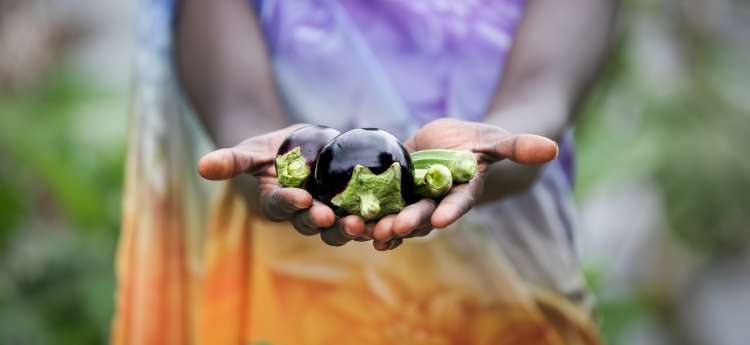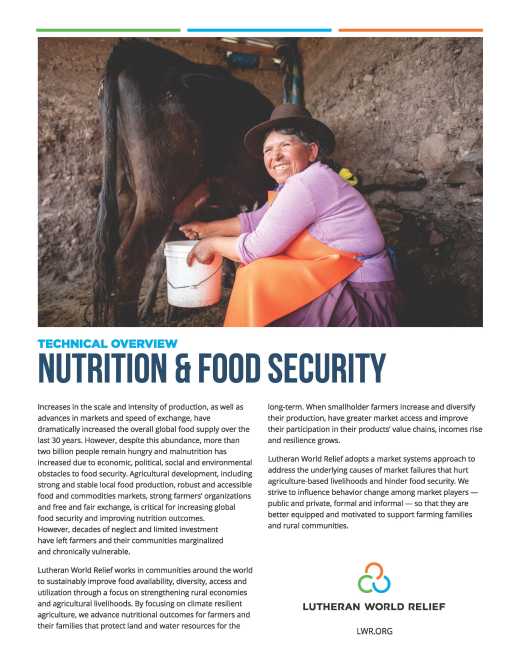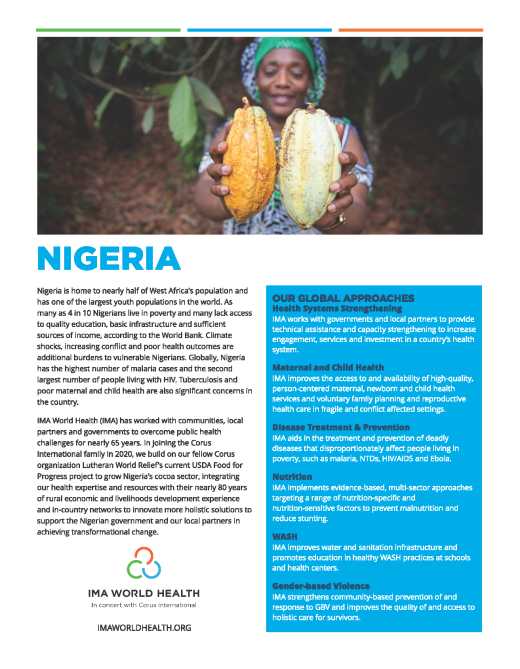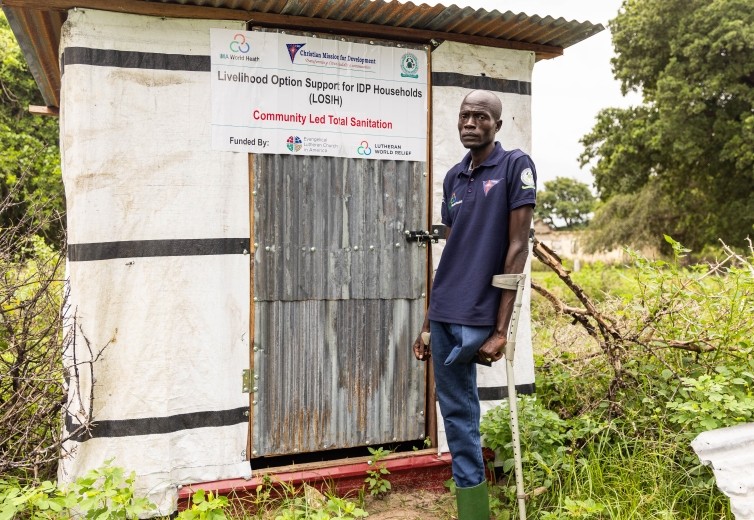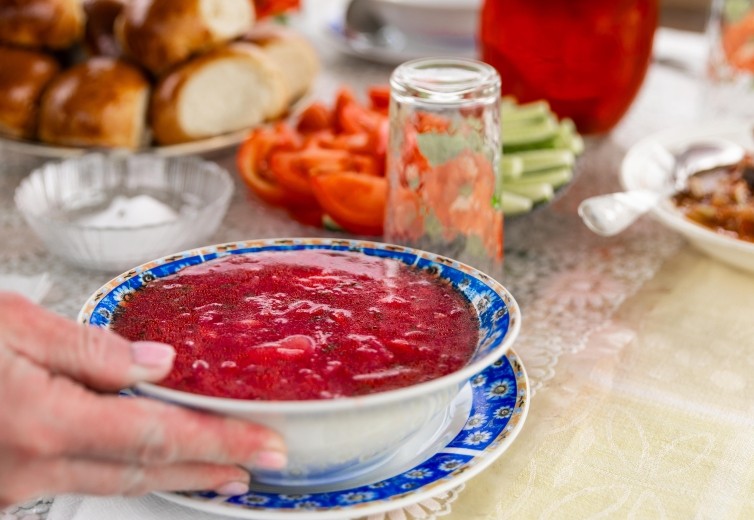Increases in the scale and intensity of production, as well as advances in markets and speed of exchange, have dramatically increased the overall global food supply over the last 30 years. However, despite this abundance, more than two billion people remain hungry and malnutrition has increased due to economic, political, social and environmental obstacles to food security. Agricultural development, including strong and stable local food production, robust and accessible food and commodities markets, strong farmers’ organizations and free and fair exchange, is critical for increasing global food security and improving nutrition outcomes. However, decades of neglect and limited investment have left farmers and their communities marginalized and chronically vulnerable.
Lutheran World Relief works in communities around the world to sustainably improve food availability, diversity, access and utilization through a focus on strengthening rural economies and agricultural livelihoods. By focusing on climate resilient agriculture, we advance nutritional outcomes for farmers and their families that protect land and water resources for the long-term. When smallholder producers increase and diversify their production, have greater market access and improve their participation in their products’ value chains, incomes rise and resilience grows.
Lutheran World Relief adopts a market systems approach to address the underlying causes of market failures that hurt agriculture-based livelihoods and hinder food security. We strive to influence behavior change among market players—public and private, formal and informal—so that they are better equipped and motivated to support farming families and rural communities.
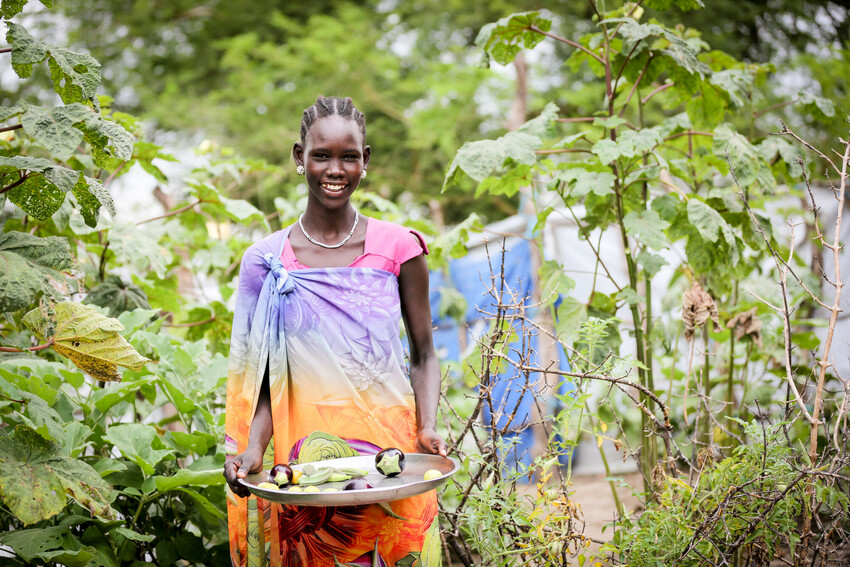
The Corus Effect
Lutheran World Relief leads rural economic development, climate and emergency programming at Corus International, a humanitarian organization that unites an array of world-class nonprofits and businesses, each with specialized expertise. Our reach and capabilities are amplified by the other global leaders in our Corus family, including global public health agency IMA World Health, education, social protection and technology company CGA Technologies, and impact investing group Ground Up Investing. Together, we bring the multi-dimensional, holistic solutions needed to truly achieve lasting change.
In Practice
With funding from USAID's Bureau of Humanitarian Assisance, the ESPOIR project in Burkina Faso supports the recovery of 2,025 food and nutrition insecure households in seven communes with an integrated services package to strengthen agricultural productivity, facilitate market access and financial services. Through the project, Lutheran World Relief and our partners provide improved information, knowledge and social behavior change mechanisms to contribute to improved nutrition in households.
In collaboration with our local partner FundaSistemas, Lutheran World Relief works to improve nutritional outcomes and strengthen agricultural development in the department of San Marcos. Applying innovative behavior change methodologies, the project utilizes home visits, technical assistance and an arts-based community development (ABCD) curriculum to promote healthy food consumption, agricultural diversification, maternal and child health and WASH best practices. Through local partnerships, the project strives to reduce stunting among children while increasing the income, yield and availability of safe, nutritious food for rural communities.
The Starbucks Foundation-funded Multisectoral Collaboration for Inclusive Health & Opportunities for Women (MECIHO) project expands women's leadership and civic engagement and improves mechanisms and services that support the advancement of healthier homes and improved living conditions. Complementing the Indonesian government’s nutrition and stunting interventions, the MECIHO project responds to significant needs in coffee-growing communities in Karo where one in four households lack clean water, sanitation challenges endanger public health and current systems of local governance regularly exclude women. Over 33,600 people benefit from nutrition-focused SBC and over 9,900 women and girls are engaged with innovations such as “garbage banks” that process community waste into fertilizer for sale.
Lutheran World Relief has been working with local partner CEDINCO (Center for Comprehensive Development of Communities) since 2011 to improve food security, strengthen livelihoods and support health and nutrition in Castrovirreyna, a remote Andean region of Peru. In collaboration with Growing Hope Globally, we work to increase yields of nutritious food by training Indigenous farmers on organic production methods, including seed banks, post-harvest storage and family greenhouses. By strengthening small livestock rearing and promoting natural iron supplements called sangrecita, the project promoted preparation and consumption of nutritious foods for children, decreasing anemia. Farmers are also trained to market their organic potato and vegetable crops — for example, selling to organic potato chip markets in Europe — and manage their farm income. The project coordinates with educational institutions and health facilities to promote social and behavior change that advances good nutrition and hygiene habits. Home visits raise awareness about anemia and parasites, teach children about the importance of hand washing and improve household WASH practices.
Funded by the U.S. Department of Agriculture's Food for Progress Program, TRACE is a five-year project that improves Nigeria's cocoa productivity through climate-smart agriculture and expands its traceability for stronger marketability. In partnership with the federal and state governments of Nigeria, the International Institute of Tropical Agriculture (IITA), the Cocoa Research Institute of Nigeria (CRIN), Ecometrica, and C-Lever.org, Lutheran World Relief implements TRACE in Nigeria's cocoa-producing states of Abia, Akwa Ibom, Cross River, Ekiti, Ondo, and Osun States. By the end of the project, over 51,000 smallholder farmers will be trained, resulting in a doubling of cocoa productivity and establishing a comprehensive (farm-to-export) traceability system that meets global standards. More than 68,400 farmers will gain access to markets, and over 366,000 hectares of farmland will be under improved climate risk reduction and/or natural resource management practices.
The U.S. Department of Agriculture’s Food for Progress PROFIT Project increases agricultural productivity for hot peppers, cassava, and okra by strengthening the capacity of 25,000 farmers, producer organizations (POs), processors and other private entities, while improving food security and the use of climate-smart agricultural practices. It also expands trade of these crops by increasing their quality to meet international standards and connecting farmers and POs with local and international buyers. Lutheran World Relief implements the project in collaboration with CRS, OADEL, RAFIA, GRED, and ODIAE in Togo’s Plateaux, Kara and Savanes regions.
The project will strengthen the capacity of research and government institutions to address critical horticulture priorities such as revenue-based solutions, food safety, and informational campaigns. It will also train 25,000 value chain actors in improved horticultural climate-smart agriculture techniques, service provision, cooperative and nursery management, seed selection, and cassava cutting utilizing the Farmer Field School (FFS) methodology supplemented by digital platforms and radio to disseminate improved agricultural production techniques. Finance options will be facilitated to benefit 21,000 farmers and small and medium enterprises (SMEs), such as Savings and Internal Lending Community (SILC) groups, microfinance institution (MFIs) and bank lending, and in-kind matching grants (15000 loans for $4 995 000). PROFIT will also promote buyer-seller relationships through the following means: use market assessments and formalization through fair and timely sales contracts, establish Producer Enterprise Agents (PEAs) to facilitate market linkages, train on post-harvest handling. processing, and food safety standards.
With a growing need to have safe, quality food, it is critical to adhere to food safety standards of buyers and regulatory bodies. Farmers and farmer organizations need to continually update their agricultural and food handling practices to ensure they produce safe food for consumption and can compete in markets at the domestic, regional and international levels – all with their own specifications and standards. With funding from the Agribusiness Market Ecosystems Alliance (AMEA), Corus organization Lutheran World Relief developed a Food Safety First Costing Tool that offers a step-by-step guide on how to plan for food safety in smallholder farming businesses and operations. It assists farmers and value chain actors, as well as project staff, to navigate the complexities of food safety issues and anticipate and allocate budget for these costs. The excel-based tool as well as its accompanying User Manual are available in English, Spanish and French and present a logical, user-friendly outline to food safety and potential costs. The Costing Tool is designed for coffee, cocoa or spices products; horticulture products; legume and grain products; and livestock and poultry products.
Corus organization IMA World Health leads the five-year, USAID-funded MOMENTUM Integrated Health Resilience project, which is part of a suite of innovative MOMENTUM awards designed to holistically strengthen quality voluntary family planning, reproductive health, and maternal, newborn, and child health in host countries around the world. This includes refining the Emergency Nutrition Network (ENN)'s strategic direction, coordinating with governments and other implementers through the MAMI Global Network and MAMI Implementers' group, and providing global technical leadership around growth monitoring and promotion among children under two years of age.
MOMENTUM Integrated Health Resilience’s Enhanced Growth Monitoring and Promotion (GMP) research, policy advocacy and technical assistance equips health workers and caregivers to identify early-stage growth faltering and provide supportive interventions before malnutrition has advanced. GMP will be assessed in two West African countries and use research findings to co-develop new GMP tools, trainings for community and facility health workers and referral systems. Expert consultation on GMP that includes policymakers, implementers and academics will integrate best practices and validate and share learning from West Africa to address GMP challenges globally.
The Multisectoral Nutrition Project (Projet Multisectoriel de Nutrition et de Santé - PMNS) is strengthening nutrition outcomes for at-risk pregnant women and malnourished children in Kasai Province, DRC. With funding from the World Bank and the DRC's Ministry of Public Health, Corus organization IMA World Health and its consortium of partners are providing nutrition services at the community level, strengthening prenatal consultations as well as revitalized preschool consultations including improved routine micronutrient supplementation, and supervising systemic intensive screening and structured home visits by community health relays. The DRC's Ministry of Health and National Nutrition Program (PRONANUT) are included in all training, monitoring and evaluation, and supervision activities to encourage synergy. Within the project, IMA World Health employs its experience supporting village savings and loan associations (VSLAs), improved cook stoves, and entrepreneurship and leadership opportunities that promote home gardening and income-generating activities for women. IMA World Health's consortium of partners for the PMNS project includes the Adventist Development and Relief Agency (ADRA), SANRU, Programme for the Development of Eastern Kasai (PRODEK), and the Congo Leadership Initiative (CLI).
To date, the project has reached 408,068 children aged 0-59 months with preschool consultations and screened 26,473 children for acute malnutrition. In the first quarter of the project (August–Sept 2023), 257,125 children aged 0-23 months received a preschool consultation, 26,473 children 6-59 months were actively screened for acute malnutrition, 787,624 home visits were made by community relays to follow up with families of children screened for/diagnosed with malnutrition, and 2,986 cooking demonstration sessions were held in communities.
Through a DFID (now FCDO)-funded contract (2015-2021), Corus organization IMA World Health partnered with the Government of Tanzania and 50 CSOs to scale nutrition support to approximately 15% of Tanzania’s population (8.43 million people) and reduce stunting of children under five by 7% or more in four Lake Zone regions. In support of Tanzania’s commitment to the Scaling Up Nutrition (SUN) movement, IMA strengthened the capacity of local government authorities across sectors to address the myriad causes of child stunting and contributed to the evidence base for what works best and most cost-efficiently in the local context.
Through ASTUTE, nearly 7,800 district health workers and non-health sector service providers were trained and three million mothers, caregivers and decision-makers were reached with improved child feeding information. The ASTUTE project created lasting change in Tanzania, including a Stunting Reduction Toolkit that continues to support Tanzania’s National Multi-sectoral Nutrition Action Plan II (NMNAP II) implementation with English and Swahili tools like Personalized Support Group guides, radio spots, and health worker home visit guides. ASTUTE used qualitative and quantitative research to refine and scale-up SBC approaches such as PDH and engagement of male caregivers in tasks such as child feeding, developmental play, and helping with household chores. Male involvement was addressed across ASTUTE, most impactfully through SBC tactics such as community dialogues and faith leader engagement. IMA partnered with 50 CSOs and 41 LGAs to deliver nutrition services and reach over 17.6 million people through local radio (the dominant rural mass media). ASTUTE results include a 24.1% increase in the prevalence of exclusive breastfeeding with a 45% increase for children aged 4-6 months (for whom breastfeeding normally declines rapidly). Maternal nutrition and care improved dramatically including mothers being 3.3 times more likely to consume a varied diet and 1.5 times more likely to receive help from their partners.
Through the USAID-funded Afya Jijini project (2015-2021), Corus organization IMA World Health strengthened Kenya's National Nutrition Center (NCC) systems to reach over 2 million women and children with high-impact nutrition interventions. Service coverage (proxy indicator Vitamin A supplementation) increased from 53% to 94% and routine monitoring of people living with HIV’s nutritional status increased from 65% to 95%. Afya Jijini provided mentorship on nutrition technical guidelines and needs-based training and coaching at 189 integrated management of acute malnutrition (IMAM) sites and 29 HIV comprehensive care centers (CCCs). Supportive supervision helped sites address long-standing challenges such as nutrition information management and helped sub-county health management teams integrate nutrition services into various health facility departments to save time for both provider and client. At the leadership level, Afya Jijini strengthened key elements of the county and sub-county health system, including dramatically improved nutrition coordination. Functional Nutrition Coordination Forums are in place as a result, guided by County Nutrition Action Plans to support multi-sectoral collaboration. Afya Jijini’s innovations include CHV-led “community conversations” to help communities tackle harmful traditional practices.
In the Democratic Republic of Congo (DRC), Corus organization IMA World Health’s DFID (now FCDO)-funded Access to Primary Healthcare (ASSP) project (2012-2019) and its follow-on Support to the Health System in the DRC (ASSR) project (2019-2021) reached over 7.5 million children and pregnant women including over 1.4 million nutrition intervention participants. IMA and our partners trained over 10,700 community health workers and nurses in malnutrition screening, nutrition education, and/or home gardening. Service utilization rates across 1,500 health facilities increased from 34% to 62% in six years through innovations such as reinforcement of community management of acute malnutrition (CMAM) with community relays (RECOs) and Infant and Young Child Feeding (ANJE) support groups which increased screening numbers and family support. Multi-sector malnutrition management initiatives promoted easily grown, nutrient-dense perennials such as moringa and chaya and complex carbohydrates like cassava through nurseries and demonstration gardens at health clinics. Learn more.
With funding from the Office of U.S. Foreign Disaster Assistance (OFDA), Corus organization IMA World Health conducted nutritional activities (2018-2020) in seven facilities in five conflict-affected counties of South Sudan in response to the growing need for an integrated response to acute malnutrition. Health services for 200,000 IDPs were provided and over 31,000 children were screened through CMAM initiatives. Activities included community outreach and screening for early detection and treatment of acute malnutrition; inpatient and outpatient management for children with severe acute malnutrition (SAM); and supplementary feeding programs for children with moderate acute malnutrition (MAM), discharged SAM patients and at-risk pregnant and lactating women.
Corus organization IMA World Health implemented the National Nutrition Communications Campaign (NNCC), a four-year (2014-2018) communications and behavior change project focused on reducing stunting, as part of Indonesia’s national strategy within the SUN movement. NNCC was a component of the larger Community-Based Health and Nutrition to Reduce Stunting Project, funded by the Millennium Challenge Corporation. NNCC worked in collaboration with the Government of Indonesia in 11 districts to increase awareness and understanding of the causes, symptoms, long-term implications and prevention of childhood stunting among parents, community members, Ministry of Health personnel, government officials and the general public; gain commitment from a broad array of stakeholders to tackle the problem of stunting; and foster individual and community behavior change related to health and nutrition among parents, caregivers and government staff. Through its strategic television campaign, from November 2015 to June 2017 the NNCC reached more than 44 million viewers with its TV spots on sanitation and infant and young child feeding—far exceeding its goal of reaching 5 million viewers. In March 2018, IMA hosted 34 governors representing every province in Indonesia, 10 ministers and the Vice President of Indonesia at the nation’s first Stunting Summit, where the Government of Indonesia committed to prioritizing 106 districts to actively fight stunting. Learn more.



